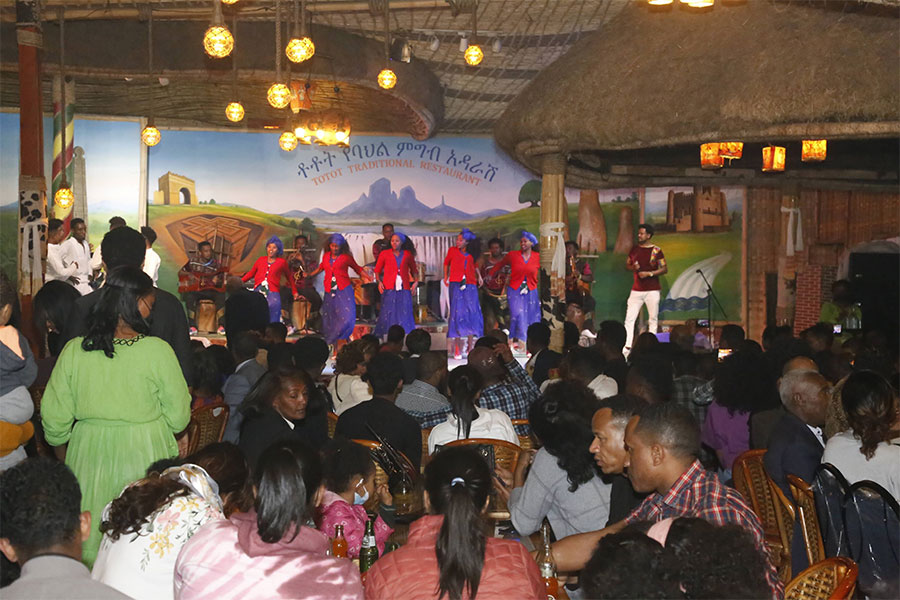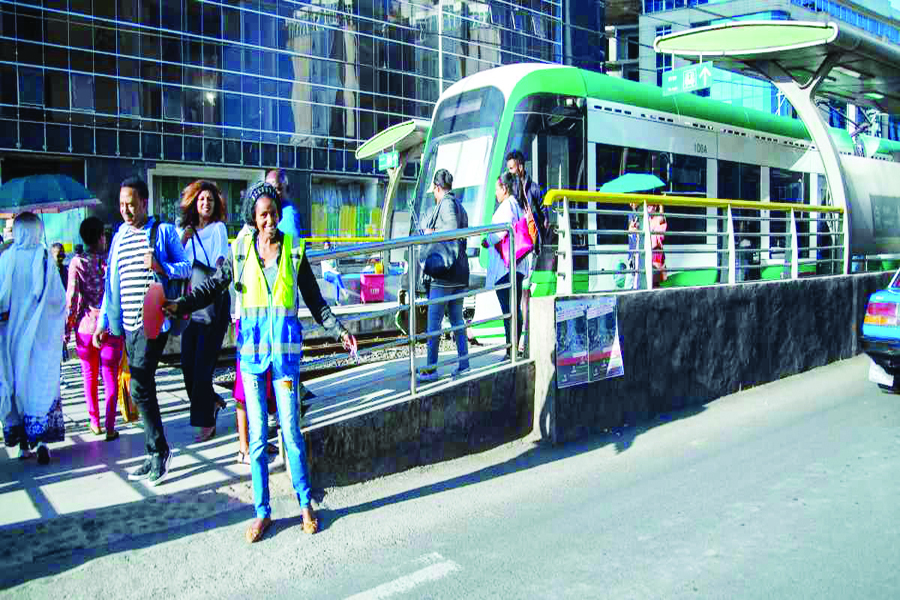
Radar | Oct 18,2025
In my recent quest for a much-needed book that led me halfway around downtown Addis Abeba, I learned that the availability of hard copies seems outdated in today's era of widespread internet usage.
My initial stop at a cosy bookstore around Meskel Square was deemed vain. After rummaging through all possible sources, I learned that it was out of stock, but persistence paid off when I stumbled upon a book-selling stall operated by a veteran engineer in the entrance lobby of the Meklit Building around the Haya Hulet area.
The kind elderly man extended an invitation to visit and explore the contents of a cushy reading room on the first floor of the building in an attempt to sustain the dwindling reading culture.
As I admired the space, a woman approached and requested for the key entrusted to me in case I left early. It was evident that the man was not acquainted with her any more than he was with me.
However, his altruistic gesture and willingness to share his reading room brought to mind a famous street in Baghdad where booksellers leave their books unattended overnight and find them untouched in the morning as they believe,
"The reader doesn't steal, and the thief doesn't read."
His magnanimous offer to pay for the monthly rental of the reading room without expecting any financial gain is a commendable initiative to entice young readers to utilise the space in today's digital age, where information is easily accessible through social media and Google.
Even with such efforts, many young people view books as a chore, leading to a decrease in reading habits. Yet social media platforms such as Facebook, YouTube, and TikTok are heavily relied upon by millions to form their opinions and shape their worldview. This has led to a large portion of the population consuming trending news items and following opinion leaders who offer a "ready-made" reality akin to instant coffee.
The flip side is that anyone with basic recording and broadcasting skills can share their opinions on these platforms without editorial filters to ensure accuracy. As a result, uninformed and biased opinions are disseminated and consumed by the masses, while informed and balanced views struggle to gain traction in the age of collective ignorance and reality distortion.
My book hunt gave me a glimpse into the reading and book-selling culture of Addis Abeba which flagged up my first encounter with the world of literature; an indelible serendipitous event. I had found a copy of the Amharic adaptation of Marie Corelli's novel Vendetta, dubbed "Biqela," on my father's mantlepiece during my childhood winter school break.
With no intention of reading it, I was drawn to the colourful book cover and intrigued by the novel's first words, "I, who write this, am a dead man," which left me mesmerised and my imagination was running wild.
I spent the entire day engrossed in reading, but as soon as my parents arrived, I hastily concealed the book. I was not entirely certain if reading an adult book was permissible, which led me to indulge in it during their absence. Eventually, my father noticed my interest in the book by leaving it in the same spot, which I took as tacit permission to keep reading.
Later that winter, he purchased more books from leading publishers of Amharic texts in the 1980s and 1990s, which ignited my passion for reading captivating fictional characters and narratives that still inspire my imagination.
In those days, books were like buried treasure. However, I embarked on a literary odyssey through my mother's subscription to the British Council library. She would wait for me at the check-in counter while I roamed through the shelves to a trove of British literature, including works by Kingsley Amis, Margaret Atwood, and Arthur Conan Doyle.
The library became a portal to another world. Some books were like old friends, familiar and comforting. Others were like new lovers, exciting and mysterious. I would read for hours on end, losing track of time and place.
The library was a magnet for me and other university students due to its rich and diverse collection for academic pursuits. I retained membership for many years until it moved to the embassy premises.
The scant availability of books in those days was supplemented by the circulation of books between avid readers who found a way to get their hands on them. Some devout readers would share books, while others offered book loan services for a small daily fee, which acted as an extra incentive for readers to finish the book quickly.
Ethiopian literature was thriving during this time, with authors like Bealu Girma, Berhanu Zeryhun, and Gesit Techane publishing their works. These books were even featured on a popular late-night radio show called Kemetsahift Alem, giving access to those who could not afford hard copies before the digital option became widely available.
Without the distractions of the internet, readers could focus on their hard copies and quench their thirst for knowledge.
The small industry still exists in the city and has nurtured many great thinkers and intellectuals. I remember a decade ago when a bookseller set up a book club near the National Theater where notable writers like Sebhat GebreEgziabher and Zenebe Wolla would gather there to exchange ideas and thoughts. It was a time when people were hungry for knowledge and reflection.
Similarly, in French Connections on France 24, the show featured a report on "The Bouquinistes of Paris." I found the open-air book stations located along the banks of the Seine River offer a wide variety of old hard copies, second-hand books, and antique books to be analogous to the street stalls in Addis Abeba, as they both provide sought-after books that may not be available through regular channels.
Despite the global trend of favouring online copies and reading gadgets such as the Kindle reader and audiobooks, avid readers still enjoy strolling through the streets of urban centres to find books. The sounds of flipping pages and the smells of old wood pulp and fresh ink all contribute to a multisensory reading experience.
I wish that same passion for wisdom would guide the youth today, like a young literature student in my university days who was diagnosed with a skin allergy and was on the horns of a dilemma: buy the ointment he needed to cure his ailment or buy a copy of the poetry book by the famous Ethiopian writer Solomon Deressa, that was sold at the same price as the ointment.
As a fetishist for romantic texts, he chose to buy the book, even though it meant persevering in the itchy condition. He later had the author sign the book and added the inscription "Better to scratch.. what else?" as a humorous commentary on his predicament.
Literature is a portal into the human psyche. It offers us a glimpse into the inner workings of the human mind, heart and soul by allowing us to explore our own emotions and experiences, as well as the experiences of others. It enables us to understand ourselves and the world around us better.
I yearn for the day when reading, open intellectual discourse, and the free exchange of ideas are commonplace in society. These activities can help to cultivate a more informed and engaged citizenry.
We should encourage youth to take the time and patience to sift through hard copies of books, as opposed to the addictive online content that can impede thorough and patient reading.
I believe that everyone, regardless of their age or background, can benefit from reading and engaging in intellectual discourse.
PUBLISHED ON
Sep 10,2023 [ VOL
24 , NO
1219]


Radar | Oct 18,2025

Commentaries | Mar 30,2019

Fortune News | Dec 23,2023

Featured | Jan 15,2022

Radar | Nov 09,2019

Life Matters | Sep 02,2023

Fortune News | Jul 13,2025

Radar | Feb 16,2019

Fortune News | Jul 07,2024

View From Arada | Dec 09,2023

Dec 22 , 2024 . By TIZITA SHEWAFERAW
Charged with transforming colossal state-owned enterprises into modern and competitiv...

Aug 18 , 2024 . By AKSAH ITALO
Although predictable Yonas Zerihun's job in the ride-hailing service is not immune to...

Jul 28 , 2024 . By TIZITA SHEWAFERAW
Unhabitual, perhaps too many, Samuel Gebreyohannes, 38, used to occasionally enjoy a couple of beers at breakfast. However, he recently swit...

Jul 13 , 2024 . By AKSAH ITALO
Investors who rely on tractors, trucks, and field vehicles for commuting, transporting commodities, and f...

Oct 18 , 2025
The political establishment, notably the ruling party and its top brass, has become p...

Oct 11 , 2025
Ladislas Farago, a roving Associated Press (AP) correspondent, arrived in Ethiopia in...

Oct 4 , 2025
Eyob Tekalegn (PhD) had been in the Governor's chair for only weeks when, on Septembe...

Sep 27 , 2025
Four years into an experiment with “shock therapy” in education, the national moo...